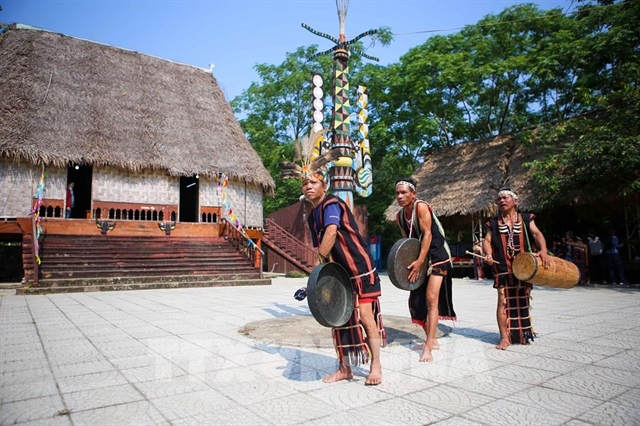 Society
Society

 |
| Cơ Tu people living in Thừa Thiên Huế. VNA/VNS Photo Lê Lâm |
HÀ NỘI — The Ministry of Culture, Sports, and Tourism has approved a plan to support the research, restoration, and preservation of the intangible cultural heritages of ethnic minorities in Việt Nam.
The plan, spearheaded by the Việt Nam National Institute of Culture and Arts Studies (VICAS), is part of the national target programme aimed at boosting socio-economic development in ethnic minority and mountainous regions this year.
The initiative seeks to preserve and promote the traditional cultural identities of ethnic groups in connection with tourism development. These areas are located across the provinces of Lạng Sơn, Bắc Kạn, Hà Giang, Bắc Giang, and Vĩnh Phúc in the North, Thừa Thiên Huế in the central region, and An Giang in the Mekong Delta.
Specifically, in the fourth quarter of 2024, the ministry has assigned VICAS to collaborate with tourism departments of these provinces and relevant agencies to carry out various research and preservation activities under the national target programme.
In Lạng Sơn, the focus will be on researching, restoring, and preserving traditional rituals such as the coming-of-age ceremony of the Dao people in Công Sơn commune of Cao Lộc district, and the Soóng Cọ singing of the Sán Chỉ people in Lộc Bình district.
In Bắc Kạn, efforts will centre on studying and preserving the traditional patterns of Dao Tiền ethnic clothing, and incorporating these into tourism product development. Meanwhile, in Hà Giang, a comprehensive study will be conducted on the Lô Lô ethnic group in Đồng Văn district.
Bắc Giang will focus on researching and preserving traditional knowledge surrounding the funeral house-making customs of the Cao Lan people in Xuân Lưong commune, Yên Thế district, with the aim of widely promoting this cultural practice.
In Vĩnh Phúc, surveys will assess the role of the Soóng Cọ Folk Song in the everyday life of the Sán Dìu ethnic group in Lập Thạch district.
In Thừa Thiên Huế, there will be a survey and collection of data on the traditional Bỏ Mả Ceremony – an important ritual to free the living from all ties with the dead – of the Cơ Tu People in Dỗi village, Thượng Lộ commune.
An Giang will concentrate on the preservation and promotion of the Rebana drum performance art of the Cham ethnic group.
Việt Nam is home to 53 ethnic minority groups of over 14 million people, or around 14 per cent of the population, spread across 58 of the country’s 63 provinces and cities. VNA/VNS